Almost There: Anthony Hopkins in "Magic"
 Thursday, October 27, 2022 at 2:00PM
Thursday, October 27, 2022 at 2:00PM 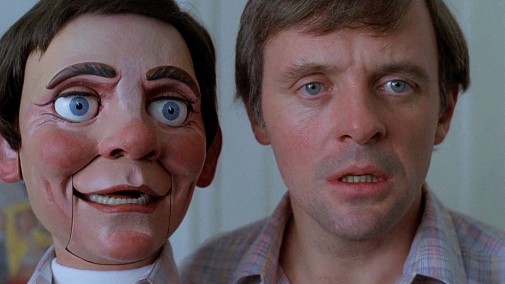
This fall will be a lovely time for Anthony Hopkins fans. The actor co-stars in both Armageddon Time (Oct 28th) and The Son (Nov 25th), playing important grandfather figures in both films. While he's said to be a warm presence in James Gray's movie memoir, the actor's second collaboration with Florian Zeller (The Father) seems better positioned to showcase the bitter and biting side of Hopkins' screen persona. After a few decades in less than stellar projects, it's a great joy to see the thespian return to form in such interesting endeavors, regardless of the mixed reactions both films have garnered. Though another Oscar nomination feels unlikely at this point in the season, watching Hopkins thrive in his 80s is its own reward.
Because spookiness is in the air, let's remember when Sir Philip Anthony Hopkins was neither a knight nor an Oscar nominee. We're going back to 1978 when Richard Attenborough's Magic saw him play a creepy ventriloquist and maybe come close to his first Academy Award nomination…
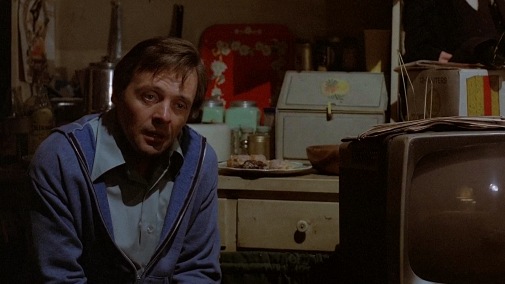
Adapted by William Goldman from his novel, Magic concerns the trials and tribulations of Charles "Corky" Withers, an aspiring magician who procures a new gimmick at the behest of his beloved teacher for his act. He settles on a mix of illusionism and ventriloquist comedy, returning home with a strange little dummy he calls Fats. The new show proves to be a success, but the possibility of fame is too bright a spotlight shined on a man who wishes to keep his mental health struggles secret. Since this character drama aspires to thrilling horrors, Corky soon becomes the center of a psychotic narrative where it appears as if Fats is the one pulling the strings.
In her scathing review, Pauline Kael found much to deride in Magic, particularly Hopkins' casting as Corky. The famed critic eviscerates the actor for his supposed inability to project light or a happy range, his incapacity for joy, his lack of vulgarity. Moreover, she also points out the weirdness of having the Welshman play a character born and raised in the Catskills, a Borscht Belt vaudevillian with an incongruous West Glamorgan accent. While it's hard to argue against this latter criticism, Hopkins' withdrawn approach to playing a grubby little showman has its appeal. Taking on a part first intended for Gene Wilder and then Jack Nicholson, the actor tackles horror like a psychologically fraught character study.
Early on, there's something in the man's soft-voiced cadence and sorrowful eyes that captivates and disarms. Moreover, we meet Corky at a low point in his personal and professional life, when joy is distant, more like an impossible dream than a reachable reality. Caring for Merlin, his bedridden mentor, the younger man lies through his teeth about the latest show he flopped, speaking of a smooth sailing evening while the screen exposes the actuality of his failure. Sweaty and ineffective, Hopkins makes Corky's stage presence into an exercise of charmless misery.
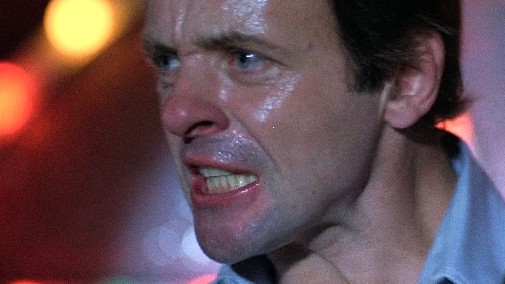
He's a man stripped of confidence to the point where he can't even hide the pain from the bored audience. Rather than wilting in that way wallflowers tend to do, he explodes in anger. Face contorting into an ugly mask while his words remain muffled by the flashback device, Hopkins makes Corky's bomb into a spectacle that's hard to watch without cringing in sympathy. It's no accident or failure on the actor's part, mind you, but a strategic portrayal of anti-charisma that's central to the characterization. When we next see him, after the moody prologue is done with, Corky doesn't seem much better at a first impression.
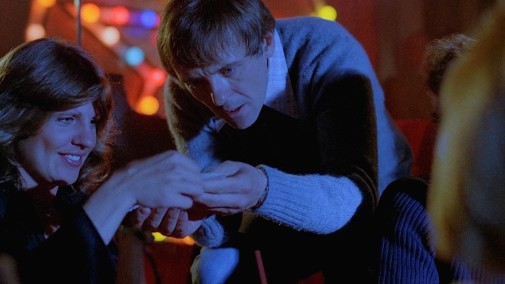
This reality is underlined by the live commentary of a TV producer who the magician's agent is trying to persuade. Once again, Hopkins exhibits a skittish lack of sureness, each trick presented with close to no flair and much concentration. It's all a bit painful if a tad smoother than before. But then, something spectacular happens. Responding to a belligerent heckler, Corky dives into the audience before returning to the stage with the foulmouthed interrupter, a puppet whose visage looks like an uncanny parody of his face. The contrast between the two presences is stark, verging on startling, meekness juxtaposed to X-rated humor, all delivered with rude insouciance.
Beyond the accent issue, there's much to admire in Hopkins' vocal gymnastics, how he captures Fats' nasally creepiness without making it absurd that the ventriloquist shtick would entertain others. The act of throwing voices and speaking through dolls is, in itself, rather morbid, but Magic goes beyond surface-level unease. Within the act and beyond its entertaining premise, there's a notion that Fats is akin to an unrepressed id, an animal volition unencumbered by humanity's burden. Such dysfunction between sound and physical form is blurred and sharpened by the similarities shared by the puppet and its perceived master, giving the idea of a noxious unity despite the diverging affectations.
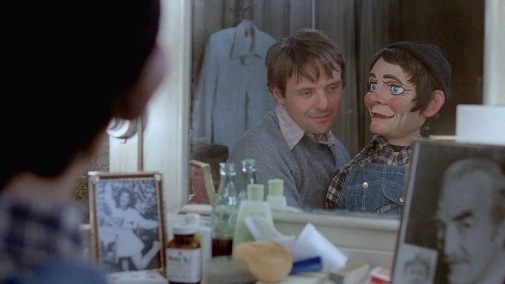
They're two parts of the same, complementing mechanisms that depend on their differences to work together. Hopkins thus portrays the creative finding, in his art, a means of self-expression and auto-exorcism, insult comedy as the parameter through which his interiority can be molded into something others wish to consume. Perhaps more crucially, the actor delineates Corky's vulnerabilities against the backdrop of Fats' incivility. It first manifests in a post-show backstage scene after great news makes Fats rejoice with the certainty of success. The grotesque wooden mouth opens wide with an unsettling smile, his blue eyes a mean mockery of Hopkins' azure peepers.
Side-by-side, they look like demonic reflections of one another, the object somehow more imposing than the man who's simultaneously soothed and intimidated by his companion. Sure, one can interpret this interaction as a mere exercise of self-care twisted into bifurcated personalities, a compulsion. On the other hand, maybe it's a desperate attempt at being confident curdled into some mental split that transcends the common qualities of ventriloquism. Or is there something more supernatural going on? Is Fats a gimmick, a barely-controlled alternative personality, or an independent foe of unnatural provenance?
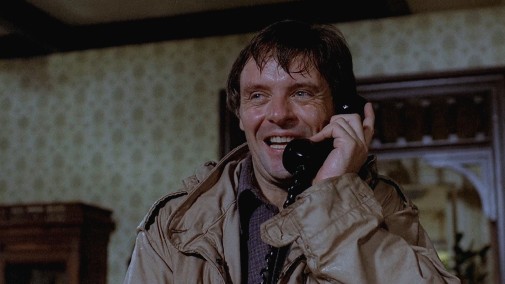
Regardless of the final answer, Hopkins makes him a fascinating threat whose ambiguity is at the heart of its power. If Magic, the movie and the practice, is about misdirection, Fats is the embodiment of its mysteries. As for Corky, he's a figure who inspired pity and revulsion in equal measure, a balancing act between the pathetic artist doomed to be the victim of his limitations and the monster whose abuse harbors evil. And yet, it's possible to disassociate Magic from the murder and madness of its later twists, conceptualizing it mainly as a study of loneliness and overwhelming discomfort within one's skin.
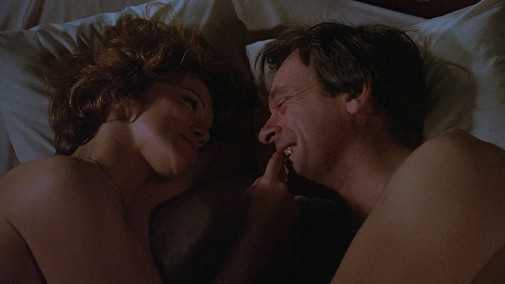
True to form, Hopkins makes for a skin-crawlingly effective leading man, allowing his magnetism to collapse into a black hole of need, self-sabotage exploding in waves of lovelorn despair. This latter facet is best exemplified by the scenes Hopkins shares with Ann-Margret's Peggy, a past girlfriend of Corky's who maybe feels as despondent as him. Whatever connection they have can just as quickly reveal tenderness as it can devolve into cruelty. With Burgess Meredith as the magician's showbiz agent, he breathes life into the paralyzing vicissitudes of Magic's most macabre concepts.
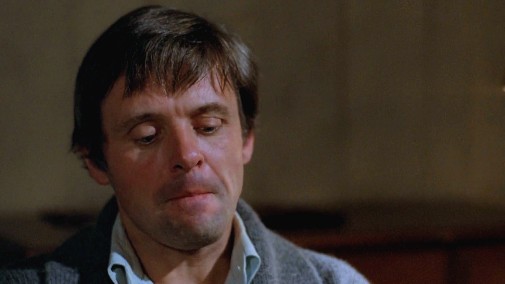
Midway through, a tense scene when the older man asks his client to spend five minutes without voicing Fats is maybe the film's most famous moment and would have made for a nifty Oscar clip – for Hopkins and Meredith alike. The Welshman saturates the screen with an addict's fidgety nerves, making Corky's awkwardness into a feeble farce of clumsy small talk, smiles insincere, and eyes unfocused. Attenborough was never a director prone to great formal gestures, but he knew how to direct actors and the power of a closeup. Anthony Hopkins takes full advantage of that directorial attention. Indeed, there are few greater horrors than seeing the trembling face of a man giving in to the madness at hand, surrendering to the siren call of violence. Still, seeing him repudiate that impulse might be even more horrifying.
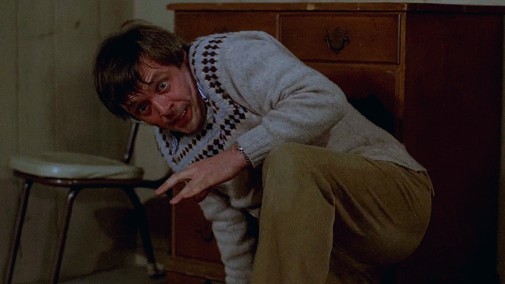
Awards Season
Though horror films have always had a hard time getting serious awards traction, Magic enjoyed some sterling acclaim. Many of its artists had then been recently endorsed by AMPAS including Ann-Margret, Meredith, Goldman, production designer Terence Marsh, sound mixer Larry Jost, and composer Jerry Goldsmith. But of course, this picture's primary Oscar bid was Anthony Hopkins, whose creepy performance was nominated for both the BAFTA and the Golden Globe. In the end, the Academy chose to honor five other men for Best Actor.
They were Warren Beatty in Heaven Can Wait, Gary Busey in The Buddy Holly Story, Robert De Niro in The Deer Hunter, Laurence Olivier in The Boys from Brazil, and Jon Voight in Coming Home. The latter won, while Olivier delivers what, to me, constitutes one of the worst performances ever nominated for the Oscars. Anthony Hopkins would have to wait until the 90s to fall into AMPAS' good graces. Once again, horror paved the way for the actor's success, resulting in his first nomination and first victory, for his take on Hannibal Lecter in The Silence of the Lambs.
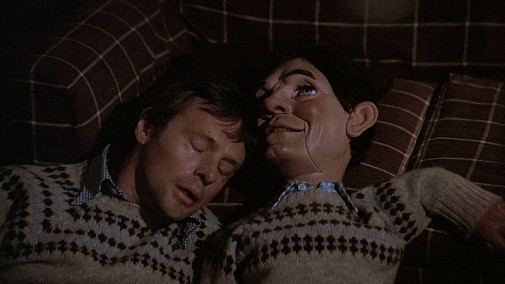
Magic is streaming on fuboTV, The Roku Channel, Tubi, Kanopy, DirecTV, Crackle, Plex, and Freevee. You can also rent it on Amazon, Apple iTunes, and the Microsoft Store.



Reader Comments (4)
I was so convinced in 1978 that Hopkins would be nominated for Magic that I lost some money in ill-advised bets. Jon Voight was assured the win. He swept almost every precursor, and the media wouldn’t let us forget that Voight lost a deserved prize for Midnight Cowboy in order to hand a career achievement Best Actor prize to John Wayne.
Oscar followers widely assumed that the fifth slot would be awarded to a performance from a horror film. On nomination morning, I waited to see if the ballot would name Hopkins or Gregory Peck for The Boys from Brazil. That year the Oscars was handing an honorary prize to Lord Laurence Olivier for his career achievement. Voters obviously felt a strong desire to continue to celebrate the revered actor. Unfortunately his hammy performance in The Boys From Brazil was unworthy but grabbed that fifth slot which had been accurately predicted to be held for a horror film.
I always see this performance the way I see Nicholson in The Shining,not that I think both are bad but the reveal is done and dusted from the off,we never question,
He's batshit crazy from the start so the suspense is kept up with who will find that secret out and when well he tip into total insanity.
Meredith for me is the standout with an Oscar worthy performance and Ann Margret brings much needed warmth to the film,the bit in the canoe is the most terrifying bit of horror in my opinion.
Correct on Olivier absolutely awful,I am not someone who warms to Sir L he's a bit like Peter O'Toole sometimes great more often than not hammy.
The make-up Oscar went to the wrong Midnight Cowboy star. Dustin Hoffman was sensational in Straight Time and really outdid himself. But the film was barely seen, and my God, is it ever a downer. It was always going to be a hard sell, but I think it's worth the effort..
As for Olivier, I think he's wonderful in an old fashioned theatrical way. Even though he's a lot of fun, the film itself is an out-and-out abomination, otherwise, and had no business being discussed as awards-worthy. (It received several nominations) I would have dropped Warren Beatty, who's barely there in his own movie. He's trying so hard to be a pleasant nice guy, he erases himself from the screen before he even registers.
After “The Father” and “The Son”, are we going to get an Anthony Hopkins project called “The Holy Ghost”?